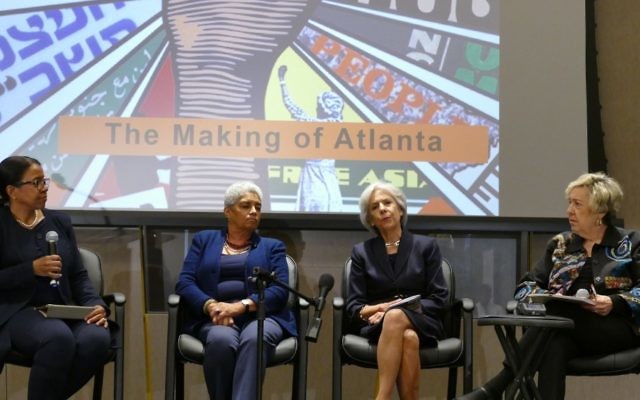Diverse Communities Paved Atlanta’s Path to Glory
Above: (From left) Andrea Young, Shirley Franklin, Laura Hardman and Sherry Frank discuss what has made Atlanta great.
By Sarah Moosazadeh | sarah@atljewishtimes.com
“Atlanta has become the fastest-growing hub in the South for businesses, economic growth and cultural diversity, yet the road to Atlanta’s glory did not come easy,” said Andrea Young, the daughter of former Mayor Andrew Young.
“It took the courage of political, civic and faith communities to come together to help make a difference,” former Mayor Shirley Franklin said Thursday, May 5, during the National Center for Civil and Human Rights’ “The Making of Atlanta” discussion at the second annual Power to Inspire Summit.

The two-day summit, culminating in the presentation of the Power to Inspire Awards at a gala dinner May 5, honored human rights defenders who shed light on current civil rights issues.
The program also gathered leaders from Atlanta’s civic and faith communities to explore solutions through dialogue.
The panelists for the “Making of Atlanta” session included Franklin, business leader Laura Hardman, and Sherry Frank, the former American Jewish Committee Atlanta Chapter director who received one of the Power to Inspire Awards that night.
“A lot of people believe that the National Center for Civil and Human Rights belongs in the North, but discussions about human rights should take place everywhere,” Franklin said.
Atlanta was best known for “Gone With the Wind” and Martin Luther King Jr. until the city hosted the 1996 Centennial Olympics.
“Civic and political leaders came together to embrace the Atlanta way,” Franklin said. Atlanta’s social-political order changed, and economic fortunes were created.
Companies such as UPS moved their headquarters to Atlanta and created opportunities.
“The Olympics unified Atlanta and became a beacon of hope for the rest of the nation,” Franklin said.
The Atlanta way also united leaders across the faith community. The Christian and Jewish communities worked through differences and built bridges of understanding. Social functions became more prevalent and promoted relationships across groups.
Since 1982, the Black-Jewish Coalition has spread awareness about issues affecting both communities.

“There are some things we can do, such as share a meal and hold constructive dialogues, even though we may disagree,” Franklin said.
“Over 100,000 people move to Atlanta every year,” Young said, because they consider the city a destination for community and tolerance. Mayor Maynard Jackson helped in that direction by creating a cultural affairs office, and since then Atlanta has flourished in the arts.
The Atlanta Jewish Film Festival is the biggest Jewish film festival in the world and brings communities together across Atlanta with films that confront racism and discrimination and spread cultural awareness, Frank said.
Emory University has influenced interfaith programs throughout the city and continues to draw large numbers of visitors to lectures throughout the year.
“Courage, cooperation and coalition drive the Atlanta way,” Franklin said. “It takes people who decide to make a difference and who are willing to work hard to make an impact with the community. With privilege comes great responsibility, and it’s up to us to help build a community and add to Atlanta’s history and glory.”




comments